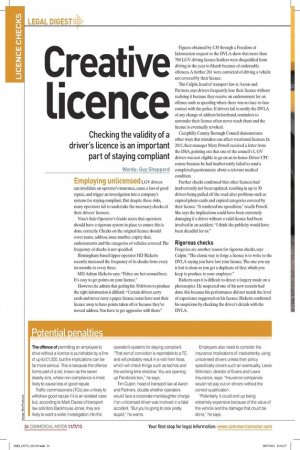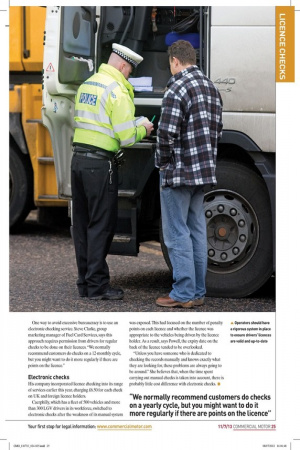creative Licence Checking the validity of a driver's licence is
Page 21

Page 22

If you've noticed an error in this article please click here to report it so we can fix it.
an important part of staying compliant Nords: Guy Sheppard Employing unlicensed LGV drivers can invalidate an operator's insurance, cause a loss of good repute, and trigger an investigation into a company's systems for staying compliant. But despite these risks, many operators fail to undertake the necessary checks of their drivers' licences.
Vosa's Safe Operator's Guide states that operators should have a rigorous system in place to ensure this is done correctly. Checks on the original licence should cover name, address, issue number, expiry date, endorsements and the categories of vehicles covered. The frequency of checks is not specified.
Birmingham-based tipper operator HD Ricketts recently increased the frequency of its checks from every six months to every three.
MD Adrian Ricketts says: "Police are hot around here. It's easy to get points on your licence."
However, he admits that getting his 30 drivers to produce the right information is difficult. "Certain drivers carry cards and never carry a paper licence; some have sent their licence away to have points taken off or because they've moved address. You have to get aggressive with them." Figures obtained by CM through a Freedom of Information request to the DVLA show that more than 700 LGV driving licence holders were disqualified from driving in the year to March because of endorsable offences. A further 261 were convicted of driving a vehicle not covered by their licence.
Tim Culpin, head of transport law at Aaron and Partners, says drivers frequently lose their licence without realising it because they receive an endorsement for an offence such as speeding where there was no face-to-face contact with the police. If drivers fail to notify the DVLA of any change of address beforehand, reminders to surrender their licence often never reach them and the licence is eventually revoked.
Caerphilly County Borough Council demonstrates other ways that mistakes can affect vocational licences. In 2011, fleet manager Mary Powell received a letter from the DSA, pointing out that one of the council's L GV drivers was not eligible to go on an in-house Driver CPC course because he had inadvertently failed to send a completed questionnaire about a relevant medical condition.
Further checks confirmed that other licences had inadvertently not been updated, resulting in up to 30 drivers being pulled off the road after problems such as expired photo cards and expired categories covered by their licence. "It rendered me speechless," recalls Powell. She says the implications could have been extremely damaging if a driver without a valid licence had been involved in an accident. "I think the publicity would have been dreadful for us."
Rigorous checks Forgeries are another reason for rigorous checks, says Culpin. "The classic way to forge a licence is to write to the DVLA saying you have lost your licence. The one you say is lost is clean so you get a duplicate of that, which you keep to produce to your employer."
Ricketts says it is difficult to detect a forgery made on a photocopier. He suspected one of his new recruits had done this because his performance did not match the level of experience suggested on his licence. Ricketts confirmed his suspicions by checking the driver's details with the DVLA.
One way to avoid excessive bureaucracy is to use an electronic checking service. Steve Clarke, group marketing manager of Fuel Card Services, says this approach requires permission from drivers for regular checks to be done on their licences. "We normally recommend customers do checks on a 12-monthly cycle, but you might want to do it more regularly if there are points on the licence."
Electronic checks His company incorporated licence checking into its range of services earlier this year, charging £6.50 for each check on UK and foreign licence holders.
Caerphilly, which has a fleet of 500 vehicles and more than 300 LGV drivers in its workforce, switched to electronic checks after the weakness of its manual system was exposed. This had focused on the number of penalty points on each licence and whether the licence was appropriate to the vehicles being driven by the licence holder. As a result, says Powell, the expiry date on the back of the licence tended to be overlooked.
"Unless you have someone who is dedicated to checking the records manually and knows exactly what they are looking for, these problems are always going to be around." She believes that, when the time spent carrying out manual checks is taken into account, there is probably little cost difference with electronic checks. •










































